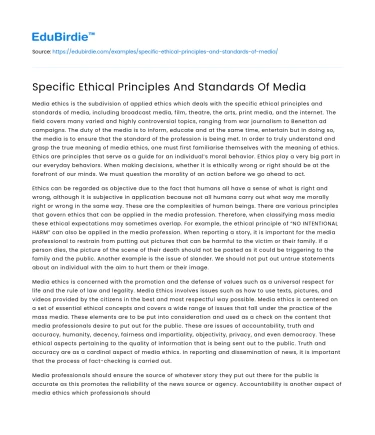Media ethics is the subdivision of applied ethics which deals with the specific ethical principles and standards of media, including broadcast media, film, theatre, the arts, print media, and the internet. The field covers many varied and highly controversial topics, ranging from war journalism to Benetton ad campaigns. The duty of the media is to inform, educate and at the same time, entertain but in doing so, the media is to ensure that the standard of the profession is being met. In order to truly understand and grasp the true meaning of media ethics, one must first familiarise themselves with the meaning of ethics. Ethics are principles that serve as a guide for an individual’s moral behavior. Ethics play a very big part in our everyday behaviors. When making decisions, whether it is ethically wrong or right should be at the forefront of our minds. We must question the morality of an action before we go ahead to act.
Ethics can be regarded as objective due to the fact that humans all have a sense of what is right and wrong, although it is subjective in application because not all humans carry out what way me morally right or wrong in the same way. These are the complexities of human beings. There are various principles that govern ethics that can be applied in the media profession. Therefore, when classifying mass media these ethical expectations may sometimes overlap. For example, the ethical principle of “NO INTENTIONAL HARM” can also be applied in the media profession. When reporting a story, it is important for the media professional to restrain from putting out pictures that can be harmful to the victim or their family. If a person dies, the picture of the scene of their death should not be posted as it could be triggering to the family and the public. Another example is the issue of slander. We should not put out untrue statements about an individual with the aim to hurt them or their image.
Save your time!
We can take care of your essay
- Proper editing and formatting
- Free revision, title page, and bibliography
- Flexible prices and money-back guarantee
Media ethics is concerned with the promotion and the defense of values such as a universal respect for life and the rule of law and legality. Media Ethics involves issues such as how to use texts, pictures, and videos provided by the citizens in the best and most respectful way possible. Media ethics is centered on a set of essential ethical concepts and covers a wide range of issues that fall under the practice of the mass media. These elements are to be put into consideration and used as a check on the content that media professionals desire to put out for the public. These are issues of accountability, truth and accuracy, humanity, decency, fairness and impartiality, objectivity, privacy, and even democracy. These ethical aspects pertaining to the quality of information that is being sent out to the public. Truth and accuracy are as a cardinal aspect of media ethics. In reporting and dissemination of news, it is important that the process of fact-checking is carried out.
Media professionals should ensure the source of whatever story they put out there for the public is accurate as this promotes the reliability of the news source or agency. Accountability is another aspect of media ethics which professionals should be familiar with. The media industry is a very sensitive industry. One untrue statement of misinformation could blow up into something big. As media professionals, if a mistake has been made on our part, we should take accountability for that mistake and correct it immediately. In doing so, we must not be cynical but express sincerity in our apology to the public.
Decency is an aspect of media ethics which professionals’ should take seriously. One must not put out content that is of poor taste and is indecent as it may be tagged as offensive to individuals and may not be suitable for little children. One must properly censor whatever needs to be censored in order for the public not to take offense to whatever is being put out there. Fairness and Impartiality: When media professionals are talking about an issue, it is important for their opinions to be put to the side.
As media professionals, we must be mindful of the content we put out there. There should not be any form of intentional harm caused to anybody as a result of the information we are putting out there. What we publish may be hurtful and harmful to some individuals, which is why we must be cautious of what we put out for the public. Television broadcasting is a media type that deals with audio-visual content. I would be using television broadcasting to make a judgment on the level of ethical practice in the media profession. To ensure that various media platforms are keeping to the set standards of the profession, there are various regulatory bodies that are put in place. In television broadcasting, The National Broadcast Commission is in charge of approving, processing, and receiving applications for the establishment, ownership or operations or radio and television stations including cable television services, direct satellite broadcast, and any other medium of broadcasting; radio and television stations owned, established or operated by the federal, state and local government; and stations run under private ownership.






 Stuck on your essay?
Stuck on your essay?

